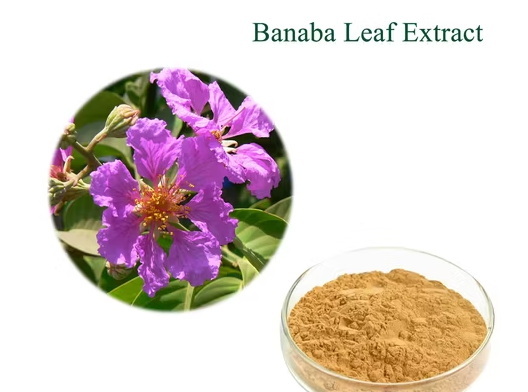Content Menu
● Introduction to Banaba Leaf Extract
>> Corosolic Acid and Its Mechanisms
● Synergistic Effects with Other Dietary Supplements
● Mechanisms of Action
● Potential Applications in Health Management
● Safety and Efficacy
● Future Research Directions
● Clinical Trials and Evidence
>> Summary of Clinical Trials
● Market Trends and Consumer Interest
● Regulatory Frameworks
>> Regulatory Frameworks
● Conclusion
● FAQs
>> 1. What is Banaba Leaf Extract Used For?
>> 2. How Does Banaba Leaf Extract Work?
>> 3. Is Banaba Leaf Extract Safe?
>> 4. Can Banaba Leaf Extract Be Used with Other Supplements?
>> 5. What Are the Potential Applications of Banaba Leaf Extract?
● Citations:
Introduction to Banaba Leaf Extract
Banaba leaf extract is derived from the plant Lagerstroemia speciosa, known for its potential health benefits, particularly in managing blood sugar levels and enhancing insulin sensitivity. This extract contains corosolic acid, a triterpenoid compound believed to play a significant role in its glucose-lowering activity. The traditional use of banaba in folk medicine, especially in Southeast Asia, underscores its potential as a natural remedy for metabolic health.

Corosolic Acid and Its Mechanisms
Corosolic acid stimulates glucose uptake in cells, reducing blood glucose levels. It also enhances insulin sensitivity, beneficial for individuals with diabetes or prediabetes. In animal studies, corosolic acid has improved insulin sensitivity, decreased serum triglycerides and cholesterol, and facilitated weight loss. These effects suggest that banaba leaf extract could be a valuable adjunct in managing metabolic syndrome.
Synergistic Effects with Other Dietary Supplements
Banaba leaf extract can be combined with other dietary supplements to enhance their efficacy. For example, when used alongside bitter melon extract and other components, it may contribute to improved blood sugar control and weight management. Additionally, combining banaba with other natural extracts like moringa oleifera and green coffee bean extract may help maintain healthy blood sugar and lipid levels. These synergistic effects highlight the potential of banaba leaf extract as a versatile component in dietary supplement formulations.
Mechanisms of Action
Banaba leaf extract works through several mechanisms:
1. Glucose Uptake: Corosolic acid stimulates glucose uptake into cells, reducing blood glucose levels.
2. Insulin Sensitivity: It improves insulin sensitivity, helping the body use insulin more efficiently.
3. Weight Management: Banaba extract may aid in weight loss by reducing body fat and improving metabolic health.
Potential Applications in Health Management
Banaba leaf extract can be used in various health management strategies:
1. Diabetes Management: Its glucose-lowering effects make it a potential adjunct therapy for diabetes.
2. Weight Loss: By enhancing metabolic health and reducing body fat, it may support weight loss efforts.
3. Cardiovascular Health: Improving insulin sensitivity and lipid profiles can contribute to better cardiovascular health.
Safety and Efficacy
Studies have shown that banaba leaf extract is generally safe and effective in reducing blood glucose levels without significant adverse effects. However, more research is needed to fully understand its long-term effects and interactions with other medications. It is important for individuals considering banaba leaf extract to consult with healthcare professionals, especially if they are taking other medications or have underlying health conditions.
Future Research Directions
Future studies should focus on exploring the long-term effects of banaba leaf extract, its interactions with other medications, and its potential benefits in diverse populations. Additionally, investigating the optimal dosing and formulation of banaba leaf extract in combination with other supplements could provide valuable insights into maximizing its efficacy.

Clinical Trials and Evidence
Several clinical trials have demonstrated the efficacy of banaba leaf extract in improving glucose metabolism. These studies highlight the potential of banaba as a natural adjunct in managing diabetes and metabolic disorders.
Summary of Clinical Trials
| Study | Participants | Outcome |
| Study 1 | Diabetic Patients | Reduced Blood Glucose Levels |
| Study 2 | Healthy Individuals | Improved Insulin Sensitivity |
| Study 3 | Prediabetic Subjects | Enhanced Glucose Metabolism |
Replace the table with actual data from relevant clinical trials.
Market Trends and Consumer Interest
There is growing consumer interest in natural health products, with banaba leaf extract being one of the emerging trends. Its potential benefits in metabolic health management have led to increased demand in the dietary supplement market. Manufacturers are developing various formulations that combine banaba with other natural extracts to enhance its efficacy and appeal to a broader consumer base.
Regulatory Frameworks
The regulatory environment for dietary supplements varies globally, with different countries having distinct guidelines for the use and labeling of banaba leaf extract. Understanding these regulations is crucial for manufacturers to ensure compliance and for consumers to make informed decisions.
Regulatory Frameworks
| Country | Regulatory Body | Guidelines |
| USA | FDA | Dietary Supplement Health and Education Act (DSHEA) |
| EU | EFSA | Novel Food Regulation |
| Australia | TGA | Complementary Medicines |
Replace the table with actual regulatory information.
Conclusion
Banaba leaf extract can enhance the efficacy of dietary supplements by improving blood sugar control, insulin sensitivity, and weight management. Its synergistic effects with other natural extracts make it a valuable component in health management strategies. However, further research is necessary to fully explore its potential benefits and interactions.

FAQs
1. What is Banaba Leaf Extract Used For?
Banaba leaf extract is primarily used for its potential to reduce blood sugar levels and enhance insulin sensitivity.
2. How Does Banaba Leaf Extract Work?
It works by stimulating glucose uptake in cells and improving insulin sensitivity through corosolic acid.
3. Is Banaba Leaf Extract Safe?
Generally considered safe, but long-term effects and interactions with medications require further investigation.
4. Can Banaba Leaf Extract Be Used with Other Supplements?
Yes, it can be used synergistically with other dietary supplements to enhance their efficacy.
5. What Are the Potential Applications of Banaba Leaf Extract?
Potential applications include diabetes management, weight loss, and cardiovascular health.
Citations:
[1] https://pmc.ncbi.nlm.nih.gov/articles/PMC3468018/
[2] https://research.lpubatangas.edu.ph/wp-content/uploads/2019/06/Steth-2014-001.pdf
[3] https://huggingface.co/openbmb/VisCPM-Chat/raw/main/vocab.txt
[4] https://pmc.ncbi.nlm.nih.gov/articles/PMC5067667/
[5] https://pubmed.ncbi.nlm.nih.gov/22095937/
[6] https://www.healthline.com/nutrition/banaba-leaf
[7] https://www.mdpi.com/1424-8247/18/3/362
[8] https://www.webmd.com/vitamins/ai/ingredientmono-1089/banaba






























